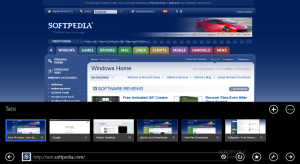 On Sunday, Microsoft released a Developer Preview version of IE 11 for Windows 7. Newer doesn’t always equal better, but IE 11 has some power under the hood that business users will benefit from.
On Sunday, Microsoft released a Developer Preview version of IE 11 for Windows 7. Newer doesn’t always equal better, but IE 11 has some power under the hood that business users will benefit from.
To some extent, a browser is a browser. They all render and display content from the Web. However, since IE 8 Microsoft has invested significant effort and resources to push the envelope and expand the browser’s capabilities. In a world where business is increasingly done online and in the cloud, it makes sense to have a browser that can deliver rich content and interactivity.
The Internet Explorer 11 Developer Preview for Windows 7 is very similar in scope and function to its Windows 8.1 sibling. Microsoft has tweaked performance, improved support for emerging Web standards, and expanded the ability to deliver an immersive experience from within the browser.
In IE 11, JavaScript runs 50 percent faster than in Chrome. It has improved support for HTML 5 features like drag and drop that will allow cloud-based tools like Microsoft’s SkyDrive and Office Web Apps to work more intuitively. IE 11 also supports WebGL for delivering smooth, 3D graphics over the Web.
A blog post from Microsoft explains some of the benefits of IE 11: “IE11 is the first browser to natively decode JPG images in real-time on the GPU, so pages load faster and use less memory, reducing power consumption and improving battery life. IE11 is also the first browser to render text on the GPU. Text and images are the heart of the Web, and accelerated text and JPG performance impacts nearly every page you see.”
More and more business is done through a Web browser. The fact is, for many business users and consumers, the Web browser is by far the single most-used application on the PC.
As I said at the beginning, a browser is a browser in most scenarios. Some support protocols or formats that others don’t, but as long as you’re using the latest version of each they’re all very similar. There’s always one that can claim to be the fastest, but we’re generally talking a millisecond here or there, and that torch is frequently passed among the major browsers.
There’s a new Web, though – Web 3.0. Web 1.0 was about simply displaying static HTML pages. Web 2.0 introduced interactivity, user-generated content, and Web applications. Now, we’re entering the Web 3.0 phase, the “intelligent Web” era of ubiquitous connectivity, data mining, and artificial intelligence.
The new Web requires new Web tools, and new Web tools need a browser capable of rendering and displaying the content. Microsoft is leading the way with Internet Explorer. You can check out Internet Explorer 11 for Windows 7 by downloading and installing the Developer Preview.





